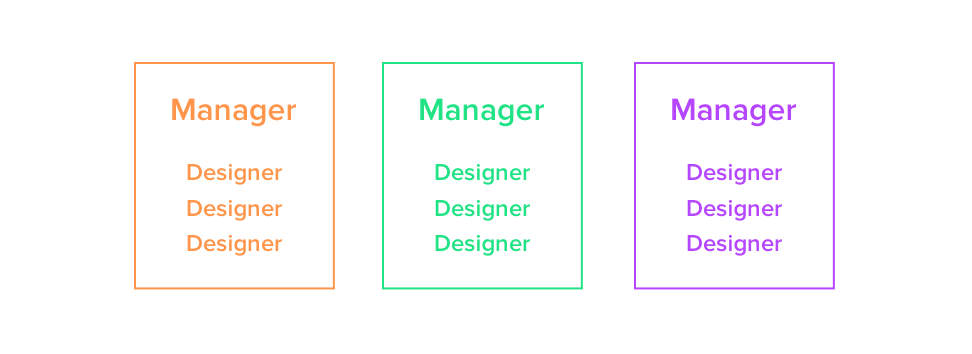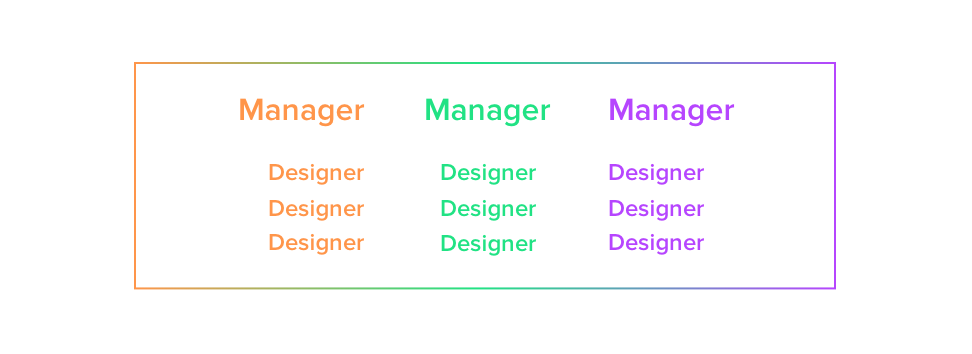When new managers start out, they tend to become hyper-focused on what's right in front of them: the designers they manage, the product team(s) they're responsible for helping, the way design is getting done in their product group, etc. That focus is not only necessary, it's great! New managers need that kind of scoped attention in order to get their feet, to become good at managing people and strike the right balance between direct and indirect feedback.
A lot of managers, though, never leave that place. As they become more skilled with the designers they're managing and the specific team(s) they're helping, many new managers start to dig in and form a brittle identity for themselves. I'm the manager for the Growth team, they think to themselves. So I'm going to make the Growth team the best team to be on. They work on culture and processes that are specific to their group, regardless of how other groups in the organization are doing. In fact, these managers can sometimes even take pride when their group is out-performing or out-culturing another in their org. Instead of sharing their successful strategies, they continue to build their silo and focus on their explicit responsibilities.
If this happens regularly enough across an organization, though, you get something that looks like this:
Many teams with many cultures and processes. Maybe that doesn't sound so bad, but this sort of thing can eventually cause a lot of problems:
It's inefficient
The problems managers face are not unique. With each new team I've taken on, I've come to realize that the problems I'm solving are generally the same as the ones I've solved before. If every manager takes three months to solve the same exact team problems on their own, that's nine months of total energy wasted. Woof. If three managers put their heads together, they could probably solve the same team problem in a single month (or less, I tend to find strong collaboration to be exponential in terms of making forward progress on a problem).
It's inconsistent
If every manager solves the same problem, but comes up with a slightly (or radically) different solution, that's probably okay in the short-term. But long-term that makes it more challenging for people to transition across teams. To transition someone from the purple team (with their own unique way of going about things) to the green team (with yet another unique way of working) is going to take time. Time when they could be more productive. I'm not saying we should standardize everything, but if every team is silo'd, you're definitely missing out on creating consistency in the places it can be the most valuable. For instance, if every manager has a different way of setting and documenting individual goals or running 1:1s, that's quite a shift for someone crossing teams. It's not only cognitive load, but it creates uncertainty: were my past goals wrong? Are these new goals wrong? If they change every time I get a new manager, how will I ever achieve them?
It's artificially limiting
Who's thinking about the department as a whole? Most first-time managers I know would point to a director (or VP). But who knows more about the challenges of the designers than their direct managers? Who better to think about how to approach those challenges? It's not only limiting to your growth and career to pass the buck down the management chain, it's also limiting to the health and growth of your entire department. Combining the knowledge of all our design managers really gives us the fullest picture of what's happening within our department at BuzzFeed. As the VP, I tend to know far less about the needs of the designers as a whole than their managers do together.
At Etsy (and now at BuzzFeed) the design managers treated our team a lot more like this:
Yes, we were each directly responsible for specific people and product teams. But we also felt a strong connection to the entire Product Design team. We collaborated on things like recruiting and the recruiting processes, promotions, and culture stuff like team critiques and outings. We shared problems with each other and would help one another out when one of us was struggling. We developed a shared point of view for how we wanted the Product Design team to work and evolve and, together, we were able to see that through.
In addition, while we generally communicated what we were doing to our Creative Director, as the three of us got more aligned and built trust (with ourselves and also our director), we found that we rarely needed to ask for permission to make changes to the entire team. I see so many managers who don't pursue larger changes because they don't feel like they have the authority to make the changes. There's an article to be written about subterfuge as a tool for good, but suffice to say that you do have the ability and authority to tackle problems you see in your organization. You just can't tackle those things alone. You need the support and collaboration from the managers around you. Once you have that, I've found there's little that can stand in the way of making progress.
Just like we ask designers, engineers and PMs to consider the entire system when designing and building their slice of it, we should also ask the same of ourselves as managers. Constantly think about how your successes or problems might be useful to other managers and teams around you. Did you try something that was particularly successful or that blew up in your face? Talk to your fellow managers about it. Share learnings or get help. Think something could be improved about your department as a whole? Collaborate with your fellow managers and propose a solution (or better yet just implement it). We have to stop thinking about just the people or team we're directly responsible for and start considering the impact we could have on everyone if we work together.

